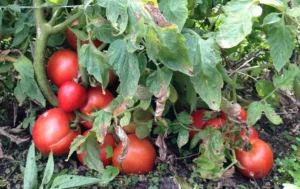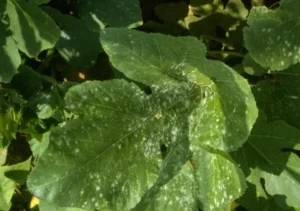Be Proactive to Prevent Vegetable Diseases
Thanks to the University of Maryland/Maryland Grows this informative article on how to prevent vegetable diseases.
Vegetable Diseases
When it comes to vegetable diseases, an ounce of prevention is worth a pound of cure. Many diseases can be stopped before they start with smart garden practices.
Spring rains cause spots, dots, and fuzzy blots to pop up in everyone’s vegetable patch. That’s fungi having fun. But whether our weather is wet or dry, fungi, bacteria and viruses stand ready to harm plants.
So, how do you keep them at bay? Be informed and watchful. Look at your plants often to spot small problems before they get big and use the following tips to prevent disease problems.
If you have repeat offenders – diseases that show up year after year – look for disease-resistant varieties. For example, there are varieties of tomatoes labeled as resistant to both verticillium and fusarium wilt.

Choose certified and disease-free plants when available
Some plants are available in certified, disease-free starts. Choose potato tubers, garlic bulbs, and asparagus and rhubarb crowns that are certified and disease-free.
Vegetables hate soggy soil. If your garden area is wet, consider creating a raised bed to improve drainage. Or, grow in containers or move the garden to an area that drains well.
You’ve heard me preach the gospel of compost time and again. But did you know that compost actually discourages some plant diseases? Garden smart by adding compostevery year.
Help prevent disease by spacing your plants properly to encourage good air circulation. Plant labels often give spacing tips as do garden books and websites.

Rain can spread soil-borne diseases, splashing infected soil up on plants’ leaves. So keep your soil covered with an organic mulch such as untreated grass clippings or newspaper covered with straw.
Fungi love wet leaves, so water wisely. Water at the base of the plant using soaker hoses or drip irrigation. And water in the morning, not the evening, so leaves dry before nightfall.
Practice tough love. Remove infected leaves or pull entire plants if they become badly infected. It’s better to lose one bad plant than the whole row. In other words, don’t compost sick plants: bag and trash them.
Overripe vegetables invite disease organisms. So, harvest your vegetables before they get mushy.
Clean your garden
A thorough cleaning of your vegetable bed at the end of the season is crucial since many diseases can overwinter in the soil. Again, if anything had a serious disease issue, bag and trash it.
For more information
If you spot a problem, e-mail your local Extension horticulturist a photo or bring them a sample to identify. Here’s a list of our county offices. We can usually get back to you in a day or two with advice.
For other growing tips and diagnostic help, visit our Home & Garden Information Center website. It has photos, management tools, and a wealth of resources. There’s even an Ask Extension link to submit gardening questions to certified horticulturists.
In conclusion, enjoy your vegetable garden this year. A few seeds and transplants, some rain, sun, and a watchful eye will have you enjoying fresh, healthy homegrown food all season long.
By Annette Cormany, Principal Agent Associate and Master Gardener Coordinator, Washington County, University of Maryland Extension. This article was previously published by Herald-Mail Media. Read more by Annette.
This article was previously published by Herald-Mail Media.
If you are looking to buy or sell your home (with or without a garden), contact Gigi today. Oh by the way, I’m never too busy for any of your referrals!





Recent Comments